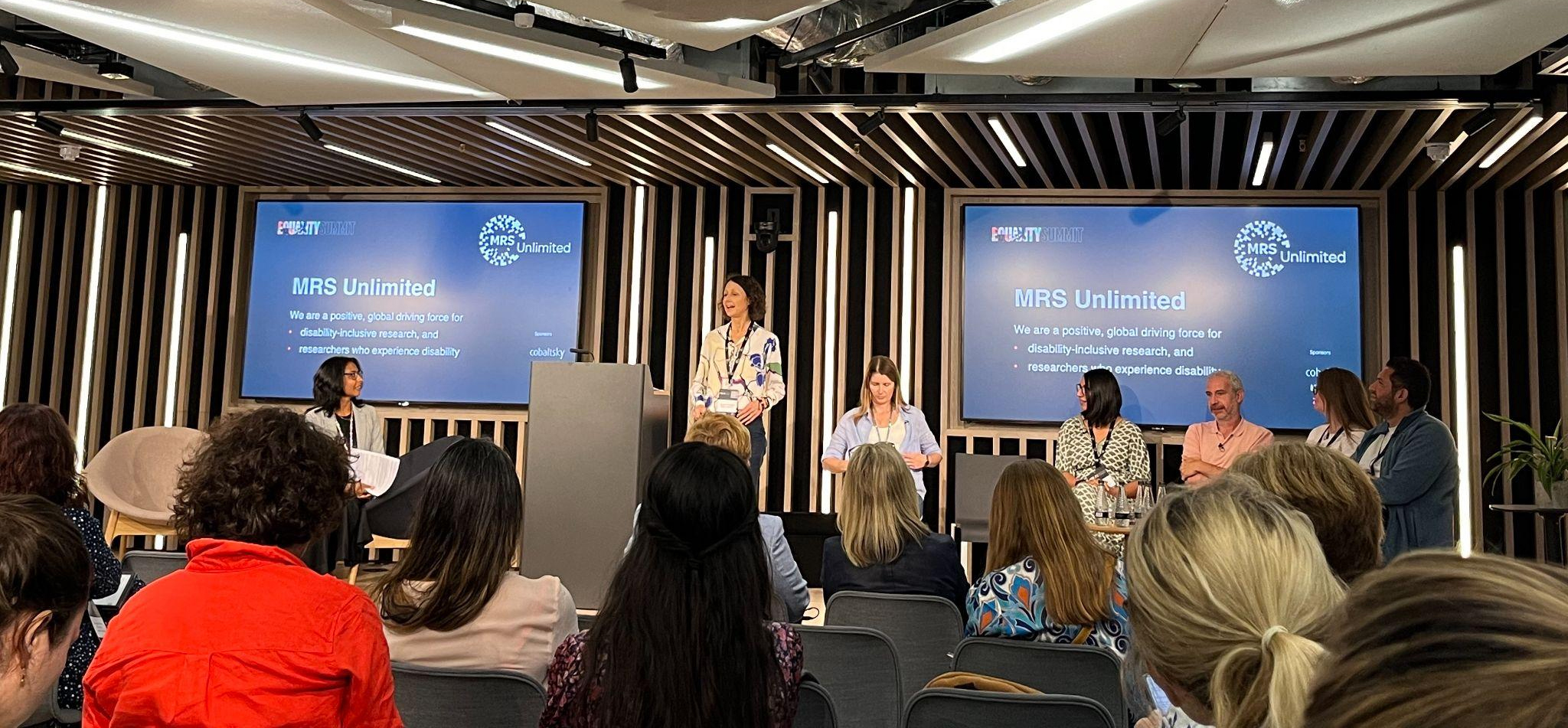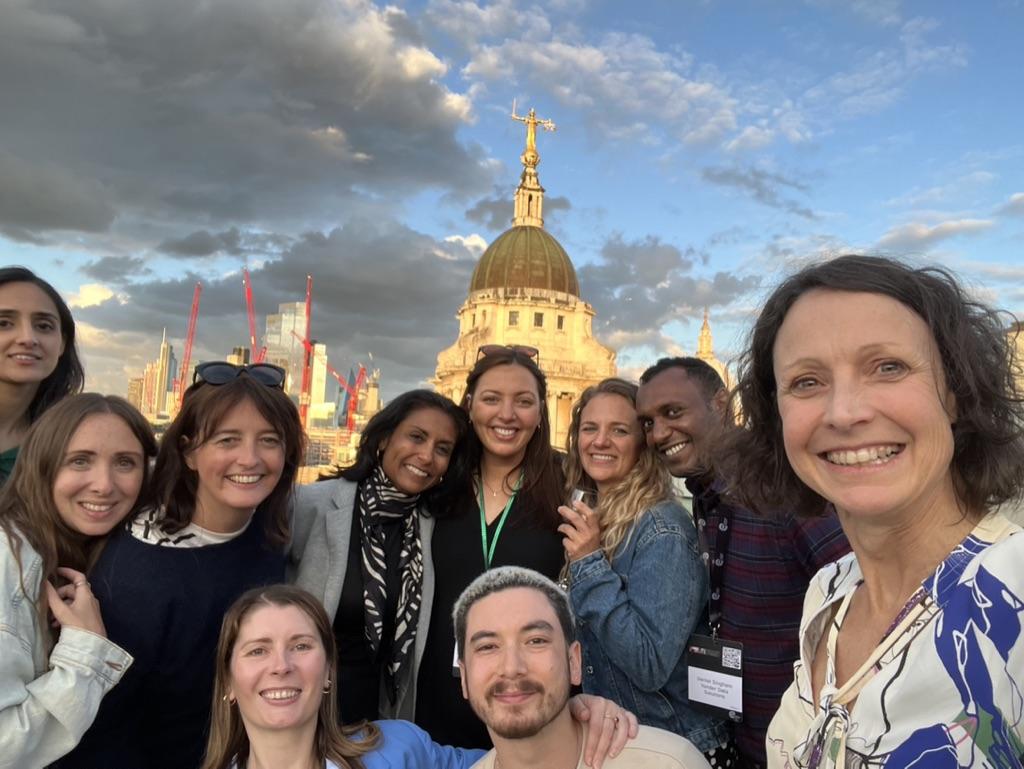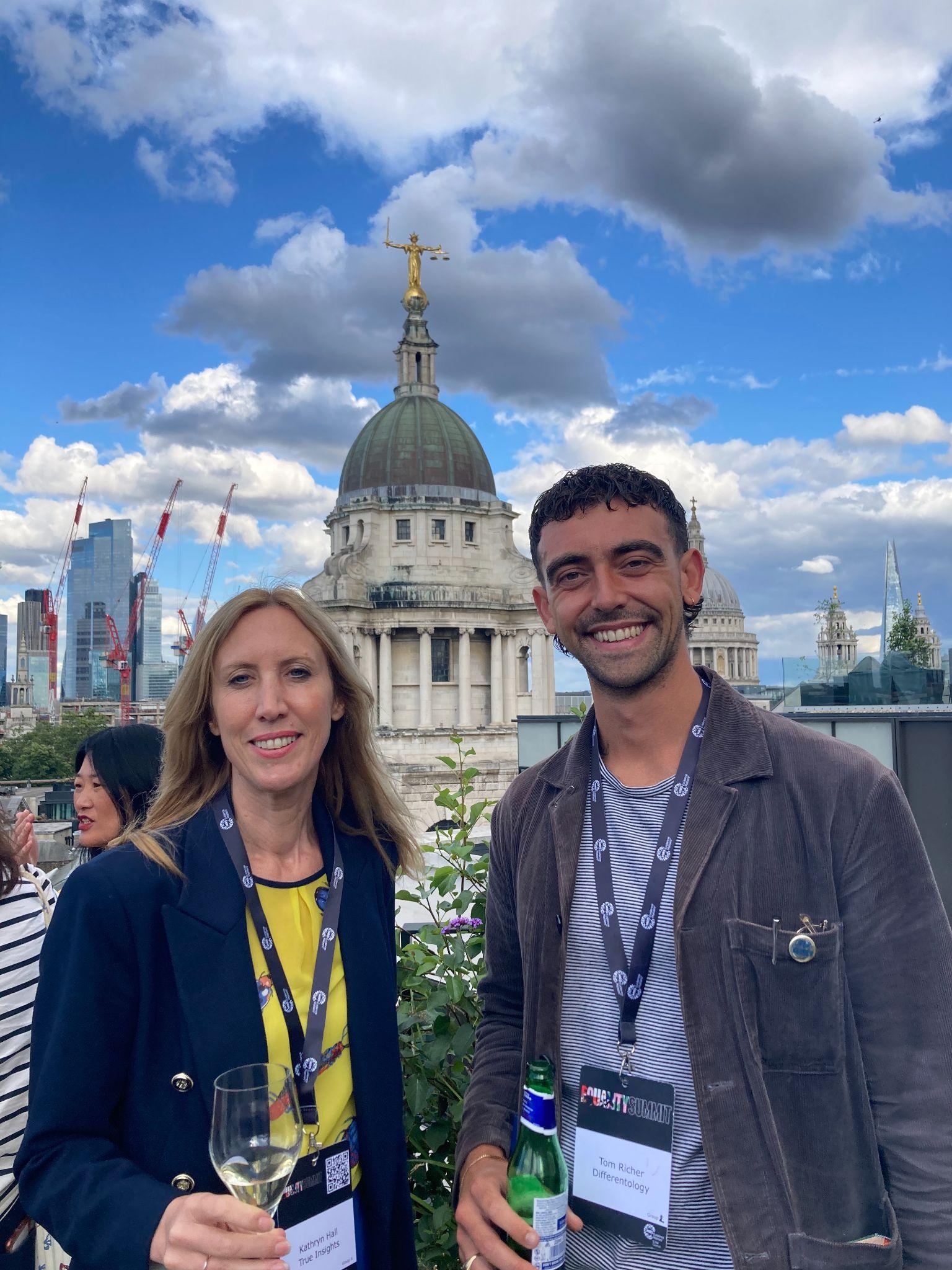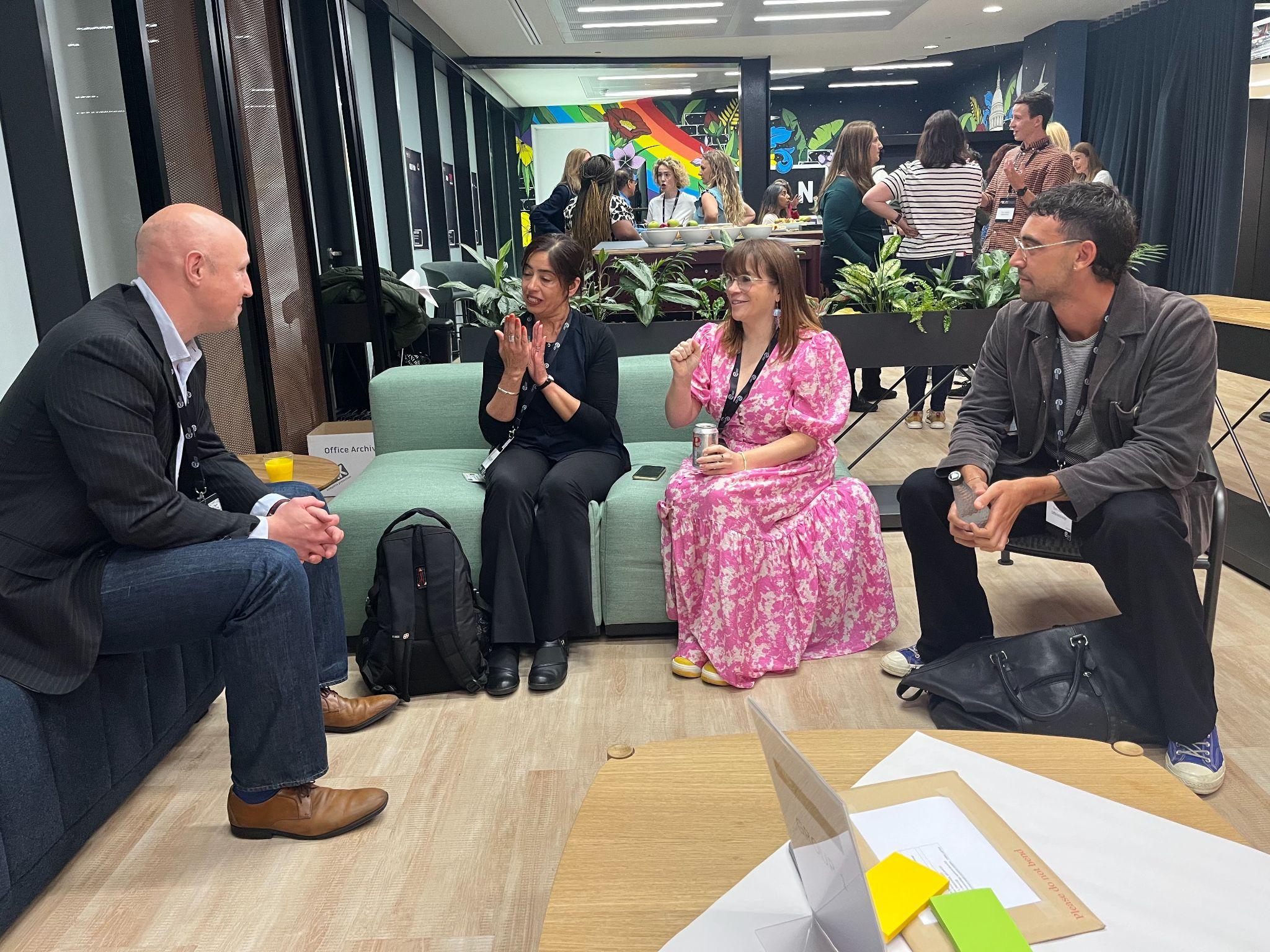MRS Unlimited -
Equality Summit 2023
1. What it was
The MRS (Market Research Society) Unlimited steering group were recently invited to the MRS Equality Summit 2023 . This was held on the 5th July in London with a range of leaders from across the affinity groups at the MRS including Pride, CoRE, WIRE, MRS Social Inclusion, and of course our lovely team from MRS Unlimited.
Although there have been some excellent collaborations in the past between individuals, organisations and groups, this was an opportune moment to bring leaders together representing many diverse backgrounds to collectively work out how we can change the speed and extent of progress.
The focus of the day was on how we identify, share and practically address barriers to speed the progress towards greater equality across the research sector. The sessions were s packed with engaging thought leaders and speakers with rich lived experiences and powerful calls to action, expert panels, chances to network and workshop our next priorties for progress towards better inclusion. Progress that is supported by the MRS’ Inclusion Pledge and builds greater transparency through quality metrics of organisations’ and the sector’s inclusion.
2. About the day
“This session isn’t about admiring the problem today, it’s about harnessing connections and building personal and collective actions that generate faster change” Christine Hemphill, Chair MRS Unlimited
MRS Unlimited is an inspiring group who all want to make change for disabled research and researchers globally. It was actually the first time we all met each other in person which was a real treat. We all brought our own accessibility adjustments such as Josef bringing an interpreter and Tom brought his Loop earplugs for the day as someone who is sensitive to noise and lots of people. Others took advantage of the wellness room / quiet space set aside for the summit. We are diverse and have our own ways of engaging effectively across a day such as this. It is this diversity of lived experiences and understanding of it which brings us together.
We had a variety of speakers on the day which set the tone for the discussions we were going to have. We were there to listen and learn, but most importantly to remember that the person standing in the room isn’t just that person, but the stages in their life had lead to where they are now.




Mark Thorpe made a very impacting statement which was around if you are from a marginalised group don’t get caught up in other’s opinions of you. They don’t have the same experience.
Here are some quotes from our steering group and what they took away from the day
Kathryn Events - “Physically meeting others who share the same goals in a safe space like this is very important. I left that day feeling inspired, and better connected and supported by others in the industry.”
Tom co-chair - "Listening to others lived experiences has always inspired me to keep moving forward. There were also some brilliant conversations happening in the workshops that have made me think differently to how I research."
Workshop
To round of the day we we ran 8 workshops to help uncover approaches to challenges we are facing in the sector. Tom was in group 2 (facilitated by Steven Lacey) “making it easy for anyone to participate in research. Let’s reduce our research participation exclusion footprint.” He’s extremely passionate about this area of research as he feels it comes down to a lot about accessibility and put himself forward to take notes and present.
Some of the key things we uncovered were
- Not a lot has changed in terms of timings, complex environments, accessibility, choice of cities to research
- It’s a double dilemma - representing a whole from just a few / having the right people involved to push for better inclusion
- Digital research is seen as more accessible however there is stil risk of exclusion
- By running mixed method research you can overcome some of those barriers of
- Language plays a huge part in making sure we do not exclude Ensuring our language is in plain english with no jargon marketing talk
- Understanding that research is the We need to think from start to finish how and were we are potentially excluding participants
- We don’t spend enough time with participants in understanding what makes them who they are. Their lived experiences carry insight but needs time and empathy.
- Ensuring we ask more questions in the recruitment phase to how we can be more accessible in our research practices.
- There’s a need to approach more international If we are not from a place or a group it is important for us to desk research appropriately.
- Segmenting audiences to understand that they may need different approaches to being research is a possibility.
Here are some key takeaways on allyship from Nicole Smyth Holland and Barrett:
- First of all defining what is an ally - “seeking to understand, represent and support these ”
- Again there was a real need for action focus from
- First theme - “Always on Culture”. Making sure it’s running true all the time and not just from one person.
- Create culture that makes peoples feel safe to come to work
- Create noise about external Get engaged in those events and show that you are there to be an ally
- Allowing junior talent to really allow them to express themselves and be who they want to be.
- Making sure representation within and outside for participation
3. About the pledge
The MRS Inclusion Pledge can be used as a key tool helping raise awareness, built intent and direct positive change towards greater equality across the sector in both our workplaces and our work. If you would like to ensure your business is please do read and sign up to the pledge here!
ED&I is improving within the market research sector since 2020. Workplaces feel like better places to be, and if we are not ashamed of what we are doing then we can openly talk about our efforts towards the pledge. However, this is still much work to do.
The pledge has since been updated realising that organisation and people need to be transparent. There’s a need for whistle blowing and not just from workplaces but the people within who may be affected. Sticking our necks out as Jane Frost said at the front. We are all really happy to see that disabilities both visible and not have been featured on the pledge.
Please do read and sign up to the pledge here.
There was a workshop on the pledge also. The key takeaways from that session are noted below.
Top 3 points from the Pledge workshop were:
- Create an ecosystem of support and good practices for the signatories. Onboarding pack to help them promote it internally to their teams and externally, good practice guides for different areas of the commitment and a walkthrough the resources available on the website (maybe by a “buddy” from another signatory who has been on for a while). Build a repository of short videos from current signatories of what they have been working on and what has been helpful to them for others to access. Have an awards programme to “catch” organisations getting this right. Easy to apply, low cost and awarding the best ideas that others can benefit from not the best written and polished
- Should we hold the right to remove signatories for those organisations or individuals who fail to provide feedback once a year including what they are doing to progress their commitment to the pledge in the following 12 months and how did they go against their commitments from 12 months ago. We still do want courageous commitments to change, so there is no penalisation for not reaching what you set out to do, just increased transparency as to how it is going for each signatory and how each is translating intent to action in their own way.
- Question the requirement to be MRS members for companies or independent consultants in order to sign the Removing this requirement is more inclusive and will much more significantly build industry-wide intent and start to change the sector while providing great positive brand recognition to MRS for leading the change.
Other ideas that came out but that didn’t make the top 3:
- Keep working on the pledge to progress it. It will never be perfect but should have at least an annual revision, and a group responsible for capturing input from across the community to assess for further improvements.
- Have cross MRS equality group sessions on different challenges or areas of the pledge (e.g. recruitment). In this way we use the pledge as a helpful anchor to work together to help agencies or organisations address that one area of opportunity or potential barrier to progress equality in their organisation taking all affinity groups’ perspectives into account as they do This could identify some really exciting solution options as many solutions today are developed one set of perspectives at a time.
- Create an online space for pledge organisations to ask, learn and share from each other on topics of interest to them to deliver against the pledge.
- Run research about the pledge not just into the signatories, but also those who thought about signing but didn’t. Learn what is putting organisations off and specifically address these gaps, fears, etc. Learn, review, decide and progress.
- Highlight signatory companies that are doing great work not just in the proposed awards but also in places to showcase their approaches and solutions that are improving their workplace or business delivery of research that is more equitable and less exclusionary of some groups, perspectives or needs.
4. Would you like to stay informed about work in EDI in market research?
If you would like to join one or any mix of affinity groups to keep informed or get involved in their efforts to progress the industry, here are the links to each of the groups in attendance at the Summit:
Core - Colour Of Research (CORe), a non-profit organisation founded to champion ethnic diversity in the research sector.
Pride - Uniting LGBTQ+ professionals and allies across the research sector
Wire - Women in Research is an international community providing educational networking events, webinars, and resources to elevate women and diverse communities in research
Unlimited - A positive force for researchers who identify as disabled, for disability-inclusive research and inclusive research workplaces globally
Social Inclusion - a new network for people across the research and communications communities who want to improve the opportunities and amplify the voices of those disadvantaged on the basis of their social background.
Allies are very welcome! You don’t need to personally identify in order to have positive impact. Significant change requires us all to listen, learn (and sometimes unlearn) and act in ways that support more equitable engagement and opportunities for all people in our spheres of influence.
Get the latest MRS news
Our newsletters cover the latest MRS events, policy updates and research news.










